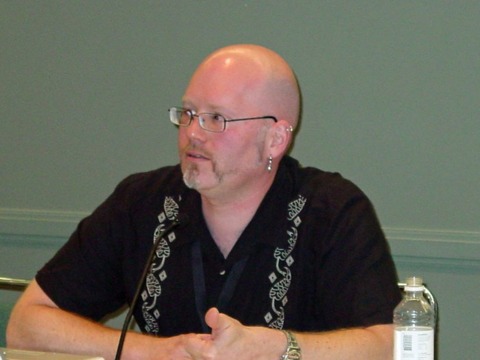PAX 2008: When player feedback backfires
Everyone has ideas on how to make games better, but Petz developer Andrew Mayer says they're not necessarily good ones.
One might not expect the producer and designer of the original Petz to attract a big crowd at the hardcore gaming celebration that is the Penny Arcade Expo. However, Andrew Mayer's "You Don't Know What You Really Want" panel attracted an overflowing crowd to the "Wolfman Theatre," with additional attendees waiting outside hoping to fill any seats vacated midpresentation.

Despite the Petz smear, Mayer boasts a lengthy resume including a wealth of casual games, Second Life, Cartoon Network's online games, and even a Zorro project for the Wii (which he suggested would never see release in the US). Over all those projects, Mayer said he learned the difference between a player and a gamer.
"When players turn the game off, it's over," Mayer said. "They don't think about games when they're not playing them."
They want the same things: Gameplay that works, substantial characters, compelling stories, gorgeous environments, and rock-solid controls. But when hardcore gamers give feedback, Mayer said they can cause more harm than good.
For example, Mayer recalled a time shortly after he and Ken Levine were in a game store shortly after the release of the latter developer's Tribes: Vengeance. The pair looked for a copy of the game on shelves and couldn't find it, so they asked the clerk if the store had the game in stock. It did, but the manager was holding them behind the counter so that "the wrong people" didn't get it.
The real-time strategy was also hurt by its most hardcore fans, Mayer said, as developers listened to their suggestions too much. Over time, the vocal hardcore crowd inspired equally hardcore RTS games that prevented any new gamers from jumping on board the genre.
"The more specialized a game is, the easier it is to make for the people who love it," Mayer said. "But if I make a game for 20 people, the more I'm risking that only 20 people buy it. If you only make a game for yourself, you're going to be the only guaranteed sale, but you'll get it for free."
Because the hardcore gamers can sometimes lead developers in the wrong direction, and developers themselves are too close to the project for perspective, Mayer's solution to the problem is to have new audiences check out the game. Things that will address that for the development team include focus testing, and user metrics, and experience.
"Make a lot of games and you'll learn something," Mayer said. "You can't trust your gut completely, but make a lot of games and you'll know when you're going down the wrong path."
Listening to the feedback received from both focus testers and players is also key, even if that feedback is going to be ignored later. Mayer talked about focus-testing Dogz, and one guy who wanted to put a jet pack in the game.
"We didn't put a jet pack in the game, but I got that people wanted a little more pizazz," Mayer said.
He also added that developers shouldn't be afraid of frustrating the player. When players are faced with a difficult challenge, Mayer said that hate turns to love once the obstacle is overcome. But developers must be careful, because a gamer that never beats a challenge is unlikely to love the experience.
"Game Design is the art of enjoyable frustration," Mayer said. "If you get what you want at the moment you want it, that's not a good game. ... You have to balance how long it will take from the moment you pick up the joystick to the moment you have mastery."
The moment that players "get" something in the game, what Mayer calls an "a-ha" moment, is no mistake, and something developers should design for.
"Good games trick you into doing what you should be doing by making you think it was your idea," Mayer noted.
One point lost on gamers at times is that one doesn't need to like something in order to understand why it's appealing to other people.
"Having empathy for other people's experiences will really help you, and not just in games," Mayer said. "Anything in media. Whether it's on a blog, a podcast or whatever, that's really going to open up the audiences. It's something I look for in the media I consume."
For more from the convention, check out GameSpot's complete coverage of Penny Arcade Expo 2008.
Got a news tip or want to contact us directly? Email news@gamespot.com
Join the conversation